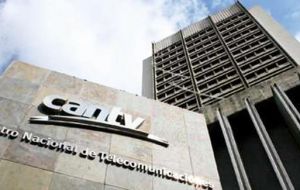MercoPress. South Atlantic News Agency
Venezuela blocks twitter images, allegedly to avoid of pictures police and goons shooting students
 CANTV, is government-run and handles the overwhelming majority of Internet traffic
CANTV, is government-run and handles the overwhelming majority of Internet traffic Twitter said on Friday that Venezuela had blocked images on its service following an anti-government protest that turned bloody, and it offered a workaround for users who want to get tweets via text message on their cell-phones.
Hacktivists, meanwhile, defaced and knocked various government websites offline, organizing and choreographing online denial-of-service attacks that flood sites with traffic, making them temporarily unreachable.
Twitter spokesman Nu Wexler said Friday via email in response to an AP query that “Twitter images are currently blocked in Venezuela.” He included the text of a tweet the company sent explaining the workaround, but did not respond to follow-up questions.
Users told AP that it appeared the blockage had ended by Friday morning. They said it was most intense Thursday, the day after two students were killed by gunfire that appeared to come from government supporters.
Venezuela's main telecommunications company, CANTV, is government-run and handles the overwhelming majority of Internet traffic. Video and still images that circulated via Twitter after the killings purported to show police and pro-government activists shooting at protesters. The images' authenticity could not be confirmed.
Media coverage of the protests was limited inside Venezuela, where the populist government dominates the airwaves. Even international media faced harassment as police smashed and confiscated cameras.
Venezuela's government also suspended broadcasting inside the country on Wednesday night of the Colombian regional news channel NTN24, claiming it was trying to incite citizens to overthrow the government.
On Friday, the director of Venezuela's telecoms regulator, William Castillo, tweeted that the government had blocked “various connections from which public websites were being attacked.”
He said “cyberattacks against Venezuela were continuing from various parts of the world.”
Venezuela has been blocking websites that track the black market rate for the country's currency for months, and for some weeks late last year hindered access to the popular Bitly service that shortens Web addresses.
The New York company said such restrictions had only previously been seen in China.
Activists said they believe the Twitter image blocking was designed to censor images that President Nicolas Maduro's government did not want Venezuelans to see.




Top Comments
Disclaimer & comment rules-

-

-

Read all commentsWow Venezuela is finally emulating China.
Feb 15th, 2014 - 09:01 am 0Unfortunately it isn't in growth or poverty reduction or even hard power.
It is in repression and media censorship.
I had a friend go back to Caracas to help his family fight for a commercial building they have owned for 50yrs that some filthy Chavista wanted to take for himself.
Feb 15th, 2014 - 12:38 pm 0He has not been heard from since fall of last year.
What a horrible place.
A whole country run by monkeys with guns.
@ 2 yankeeboy
Feb 15th, 2014 - 02:19 pm 0That’s a bit hard on the monkeys.
The cretins seemingly enthralled by Maduro aren’t half as intelligent as monkeys.
Commenting for this story is now closed.
If you have a Facebook account, become a fan and comment on our Facebook Page!